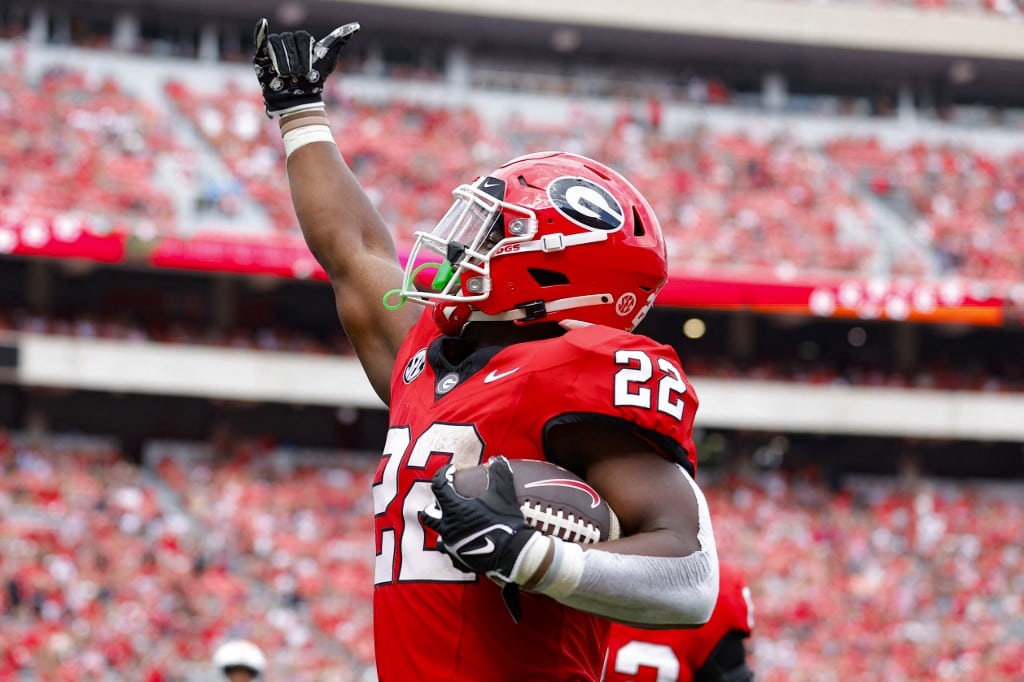
The sportsbooks have released their betting odds for Saturday’s high-profile soiree between Georgia and Alabama.
With both teams being national championship contenders every year, this is arguably the biggest game of the season. So, you’ll want to get involved betting-wise.
NCAAF Pick: Georgia ML (-130) at Bet365 (check our Bet365 Review)
Georgia Bulldogs vs. Alabama Crimson Tide
Saturday, September 29, 2024 – 07:30 PM ET at Bryant-Denny Stadium
Should Georgia’s Last Game Influence Our Bet?
It is tempting to dislike Georgia because of recency bias, the phenomenon whereby we are disposed to attach exaggerated levels of significance to the most recent events.
This psychological phenomenon was always going to incline bettors to dislike Georgia this week because the Bulldogs, in their last game, traveled to Kentucky where they suffered unique difficulties. Georgia’s offense under Kirby Smart averages two fewer touchdowns in its games at Kentucky, compared to its other SEC road games.
The takeaway here is that Georgia is capable of winning in difficult road environments, with its 38-10 win in Tennessee last year providing one example. It merely has difficulty winning in Kentucky.
Moreover, Georgia’s last game is misrepresentative of what it is capable of doing because that game took place before this high-profile showdown against Alabama. Kirby Smart has admitted that his players had difficulty concentrating during practice. They were looking ahead to this upcoming game.
We should, therefore, not attach significance to Georgia’s last game, because it took place in Kentucky and because it was a classic “look-ahead” game.
Should Tate Ratledge’s Injury Concern Us?
When Georgia nearly lost to Kentucky, its offensive line played terribly.
Now, Alabama backers are going to suggest that there is a specific reason for this: Georgia lost a very talented offensive lineman, Tate Ratledge, to injury. The significance of losing Ratledge is, however, utterly overstated.
Georgia, even while Ratledge was healthy, already rotated different players at his position. Micah Morris, who appeared in 13 games last season, is easily able to slide in and replace Ratledge, so Ratledge’s loss in no way explains the poor performance of Georgia’s offensive line.
This is still an extremely talented group, with three other active offensive linemen — Earnest Greene III, Dylan Fairchild, and Xavier Truss — having been All-SEC selections.
Georgia’s Rush Attack
In its season-opener against Clemson, Georgia amassed 169 rushing yards on 6.3 YPC and collected 278 passing yards while allowing all of one sack.
Despite facing softer competition than what Georgia has to offer with the likes of Trevor Etienne and his 6.5 YPC, Alabama ranks an uninspiring 57th in run defense.
In its last game against Wisconsin, Bama allowed Wisconsin running back Chez Mellusi to enjoy a very efficient performance from his first drive onwards.
This is a Bama run defense that Georgia can thrive against to the extent that it did against a Clemson group that is anchored by a deep group of very talented and well-sized defensive tackles and that boasts strong defensive ends like All-American Peter Woods.
Pass Protection for Georgia
Against Alabama, Georgia’s pass protection promises to be stout. Bama, in the offseason, lost its top three sack-getters from last season: Dallas Turner, Chris Braswell, and Justin Eboigbe.
Those were their only three players who had more than three sacks last season. The trio combined for 25 sacks. Without them, Bama currently ranks 54th in sack rate, 33 spots behind Kentucky.
This significant disparity in proven experience — between Georgia’s pass protection unit and Alabama’s pass rush — will enable Georgia quarterback Carson Beck to be very comfortable in the pocket, whereas he was often flustered in his last game against Kentucky.
Again, the Bulldogs will be focused on this game, so this pass protection unit, laden as it is with All-SEC performers, must be expected to perform as well as it is capable of doing.
Alabama’s Declined Secondary
A strong concern is this: how can Alabama’s declined secondary hold up given its diminished ability to sack the quarterback? Alabama lost its two starting cornerbacks during the offseason.
The result has not been one that is completely apparent on paper, because Bama’s secondary has, thus far, benefitted from several times in which opposing quarterbacks — South Florida’s, for example — missed wide-open targets downfield.
Georgia’s quarterback, Carson Beck, is easily more accurate than any quarterback Alabama has faced so far. With several targets to throw to comfortably, Beck is averaging around his usual 70-percent completion rate, in addition to throwing seven touchdowns to zero interceptions.
Expect the likes of Dominic Lovett, who caught six passes for 89 yards in his last game, to step up against Alabama’s regressed secondary, which will have an even harder time than usual not only because of Beck’s superior accuracy but also because of Georgia’s eminent pass protection.
Georgia’s potential to hit big plays was evident even in its win against Kentucky. Wide receivers were available downfield. The pass protection just needed to hold up, as it will against Alabama. Indeed, Carson Beck clinched the win against Kentucky with a 33-yard throw to Lovett.
Alabama is vulnerable to deep completions because its defensive scheme places an unusually high burden on its defensive backs downfield — they have to be unusually cohesive, trusting, and communicative.
Georgia, with Beck — whose downfield accuracy is the subject of many scouting reports — is well-equipped to take advantage. Expect the extremely fast deep threat, the essentially world-class sprinter Arian Smith to be another wide receiver to benefit from Beck’s downfield accuracy, as he’s already been benefiting from it.
Alabama’s Reliance on Explosive Plays
For both its rush attack and its quarterback, whose strength is throwing the ball downfield, Alabama is excessively reliant on achieving explosive plays, with two-thirds of its touchdown drives being comprised of no more than four plays.
This reliance on hitting home runs will be a problem against a Georgia defense that has allowed two 20-yard gains and a 30-yard one all season.
Diminished in its explosiveness, Alabama’s rush attack will be exposed for its unimpressive efficiency — its YPC total is heavily skewed by its explosive plays — while its pass attack will struggle to sustain drives.
To give credit where credit is due, Alabama certainly does have a very talented running back room. However, the Bulldogs pose a uniquely tough defensive challenge that annually has one of best run defenses, largely because it limits explosive plays.
Georgia’s Top-Level Pass Rush and Secondary
Especially with Georgia’s offensive potency in this game, Alabama is going to fall behind and is going to have to rely on passing the ball in order to keep pace.
Keeping pace, however, is too hard a task given the Bulldogs’ pass defense. Georgia’s secondary already has a comparatively easy job because of its pass rush. Despite having injuries in its front seven, Georgia ranks 34th in sack rate, and it is primed to improve upon this ranking as more guys get healthy.
When Jalen Milroe does get pass attempts off in time, he’ll rely heavily on freshman Ryan Williams, who has more than twice as many receiving yards as any of his teammates. Georgia has a well-stocked, deep, and developed secondary, led by a cornerback who is ideally equipped to contain Williams.
Ryan Williams wants to make use of his speed. However, Georgia cornerback Julian Humphrey is extremely fast himself. Humphrey has run a 10.55 100-meter dash. Humphrey’s speed is only one reason why he’s likely to be a second-round draft pick in the next NFL Draft. His fluidity, among other traits, allows him to contain wide receivers in isolation, although, especially given the extent to which Bama wants to lean on Williams, Humphrey is likely to get extra safety help.
Indeed, safety Malaki Starks is an All-American selection largely due to his top-level coverage skills. He can play centerfield for Georgia’s pass defense, but he can also match up effectively against tight ends and wide receivers in man-to-man coverage. He has great reactive instincts, speed, range, and ball skills.
The Takeaway
Georgia’s last game is not a source of concern but a source of optimism. Kirby Smart’s Bulldogs have averaged over 37 points per game in the eight games that followed one in which they failed to score 20+ points.
They will be strong both on the ground and through the air against an Alabama defense that has proven vulnerable both against the run and against the pass, as it is failing to overcome various difficulties, including a new scheme that asks a lot of its back end and the loss of key pass rushers.
On offense, the Crimson Tide’s running back room will face a unique challenge. Even if the likes of Jam Miller were to improve on the 2.6 YPC that he averaged against Georgia last December, Alabama is going to have to rely on its pass attack in order to keep pace with the Bulldogs’ offense.
Jalen Milroe, reliant as he is on the deep ball and on Ryan Williams, matches up poorly against a Georgia defense that limits explosive plays and has the cornerback quality to contain his top target.
Georgia’s pass rush and secondary will ensure a strong win for the Bulldogs.
NCAAF Pick: Georgia ML (-130) at Bet365
*The line and/or odds referenced in this article might have changed since the content was published. For the latest information on line movements, visit OddsTrader’s free betting odds tool.







